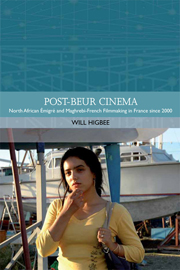Book contents
- Frontmatter
- Contents
- Acknowledgements
- List of Illustrations
- Traditions in World Cinema
- 1 Introduction: From Immigrant Cinema to National Cinema
- 2 The (Maghrebi-)French Connection: Diaspora goes Mainstream
- 3 Colonial Fracture and the Counter-Heritage Film
- 4 Of Spaces and Difference in the Films of Abdellatif Kechiche
- 5 Home, Displacement and the Myth of Return: Journey Narratives in the 2000s
- 6 Screening Islam: cinematic Representations of the Muslim Community in France in the 2000s
- 7 Conclusion: Post-Beur Cinema
- Bibliography
- Index
7 - Conclusion: Post-Beur Cinema
Published online by Cambridge University Press: 05 October 2013
- Frontmatter
- Contents
- Acknowledgements
- List of Illustrations
- Traditions in World Cinema
- 1 Introduction: From Immigrant Cinema to National Cinema
- 2 The (Maghrebi-)French Connection: Diaspora goes Mainstream
- 3 Colonial Fracture and the Counter-Heritage Film
- 4 Of Spaces and Difference in the Films of Abdellatif Kechiche
- 5 Home, Displacement and the Myth of Return: Journey Narratives in the 2000s
- 6 Screening Islam: cinematic Representations of the Muslim Community in France in the 2000s
- 7 Conclusion: Post-Beur Cinema
- Bibliography
- Index
Summary
Speaking in 1989, after the initial promise of Beur Cinema appeared to have reached an impasse, Algerian émigré director Abdelkrim Bahloul summarised the situation facing filmmakers of Maghrebi origin in France:
The North African was absent from films, or else was shown in a stereotypical way […] because the Maghrebi community didn't have the means to take hold of its own image […] As filmmakers from this community we don't want to restrict ourselves to the problems of immigration. Our imagination is far greater than that. It is because we are aware of the limitations and the misrepresentations offered in other films that we feel compelled to speak [in our own films] about these issues, time and time again.
(Bahloul in Coutault 1989: 58)The position arguably remained much the same for Maghrebi-French and North African émigré filmmakers during the 1990s. Whilst the decade was marked by the emergence of a number of important new voices in Maghrebi-French filmmaking (from grassroots directors such as Malik Chibane and Zaïda Ghorab-Volta to those with mainstream aspirations such as Djamel Bensalah and actor Jamel Debbouze), the number of features directed by filmmakers of Maghrebi origin in the 1990s was still extremely small. Moreover, those films that did emerge during this period were almost all either comedies or social realist narratives depicting issues such as immigration, integration and social exclusion from the perspective of North African immigrants and their French-born descendants. In short, they remained for the most part trapped within the essentialist categories of beur and banlieue filmmaking that had become over-determined from without.
- Type
- Chapter
- Information
- Post-beur CinemaNorth African Émigré and Maghrebi-French Filmmaking in France since 2000, pp. 182 - 191Publisher: Edinburgh University PressPrint publication year: 2013



